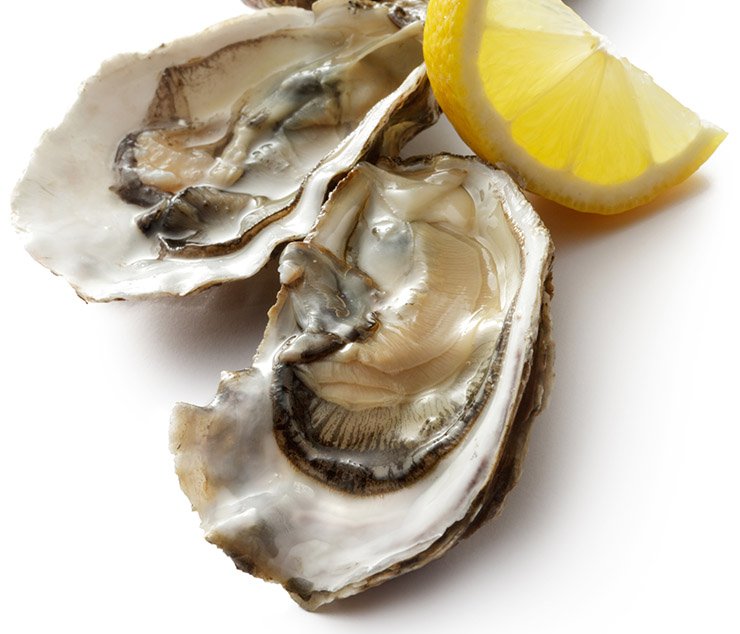Oyster October
"Les Poisson, les poisson, 'ow I looove les poisson!" That Little Mermaid song is dang funny even if it is somewhat macabre... October is National Seafood Month! If you're new to Foods with Judes, you will soon find out I have a great love for our underwater friends, both to protect and to eat!
Seafood has extremely positive effects on our health and brain function. You can learn more about why this is true, in addition to other clarifying mercury tidbits in a previous article, "Seafood Newsflash." Also, learn more about choosing sustainable seafood in my newly released book, "Lean Body, Smart Life." I could go on for days about health benefits of different kinds of seafood, but this month's healthy challenge will focus particularly on oysters. Don't worry - you don't have to eat them raw.
Oysters: good for you and the environment
Oysters are not only an incredible source of nutrition we get from the sea, but they help the environment too. They are natural filters, which makes them a valuable asset for the waters they live in. They can be bred and cultivated as a renewable resource. So whether you're an oyster in the water or an oyster on the plate, you're sitting pretty.Oysters have an unbelievable amount of zinc, an essential mineral for the human body. They have about 500% of the daily requirement (or % daily value) in six medium oysters. Zinc promotes bodily cell growth and revitalization, including cells in our bones and skin. It lowers blood pressure, helps our bodies heal faster, promotes reproductive health, boosts energy levels, and more. You've got to be a soul-snatching sea witch to reject these kind of benefits!
Nutrients found in Oysters
In addition to zinc, oysters have a surplus of iron (31% daily value), calcium (4% DV), phosphorus (11% DV), copper (187% DV), and selenium (76% DV), which all promote bone strength, durability, and mineral density. If that isn't enough motivation to eat oysters, they also have high levels of Vitamin D (67% DV), B12 (272% DV), manganese (15% DV), protein (6 g/6 oysters), choline (55 mg/6 oysters), and omega-3 fatty acids (565 mg/6 oysters). Many of these minerals are strong antioxidant and anti-inflammatory phytonutrients that neutralize toxins and boost our immune systems. The kicker is that most of these nutrients are low in other foods, and we need them! So eat a few sea mollusks on occasion to pack a healthy punch of nutrients we tend to lack.
Some words of caution before you sign away your voice: Since oysters are natural filters, they do pick up minerals from their environment. It is important to get your oysters from a reliable source since they sometimes pick up other toxins or pollutants. It is also important to consume oysters in moderation since their high mineral content could lead some to suffer signs of mineral overdose or toxicity if overeaten (especially of zinc, vitamin B12, D, copper, iron, and selenium). High potassium and magnesium found in oysters help blood flow, circulation, and pressure, and Vitamin E helps cell membranes in their flexibility and strength, which is excellent protection against heart disease. However, if you are at a high risk of high blood pressure or heart disease already, the high sodium content of oysters might be a problem. Obviously, avoid them if you have shellfish allergies.
Not everyone is cut out for the texture of these babies in their raw state. Have no fear! Cooked oysters are still loaded with these fantastic nutrients and are delicious without that slimy feel some fear. Eat them roasted, grilled, or even fried on occasion (you know I don't say that often) to enjoy their scrumptious flavor while taking advantage of their health-promoting nutrients.
Summertime may be great for the beach, but not so much for oysters. They're flimsier right after spawning, and warmer waters cause for more food safety problems. PSP (paralytic shellfish poisoning) is also a risk with higher red tide levels in the summer. Better to stick to cold month oysters. Months between September and April are prime for our shelled sidekicks. They're plumper and sweeter out of cold water too.Pearls aren't the only thing of value that comes from oysters...Eat oysters more often but don't go crazy. A few times a month is enough to delight in the rich store of health that comes with them!

Judith (aka Judes) Scharman Draughon, MS, RDN, LD is a registered, licensed dietitian nutritionist, author of 12 Fixes to Health: A Wellness Plan for Life, as well as a corporate wellness speaker. Judes inspires many with her high-energy nutrition presentations, workshops, and seminars throughout the county. She is known as “Foods With Judes.”
Judes is passionate about her quest to empower people to make small changes that make a big difference. She can’t wait to empower you!
Let's connect! LinkedIn, Instagram, Facebook, Twitter
Contributor: Ray Norton



